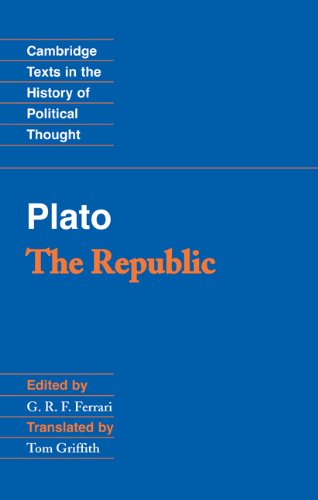Plato: The Republic (Cambridge Texts in the History of Political Thought) epub
Par smith willard le dimanche, octobre 9 2016, 04:12 - Lien permanent
Plato: The Republic (Cambridge Texts in the History of Political Thought). Plato, G. R. F. Ferrari, Tom Griffith

Plato.The.Republic.Cambridge.Texts.in.the.History.of.Political.Thought..pdf
ISBN: 052148443X,9780521484435 | 436 pages | 11 Mb

Plato: The Republic (Cambridge Texts in the History of Political Thought) Plato, G. R. F. Ferrari, Tom Griffith
Publisher:
Plato: 'The Republic' (Cambridge Texts in the History of Political Thought) - G. In other words, Machiavelli tells the reader that he can obtain the knowledge of political matters via Machiavelli's thoughts on historical affairs. In academia, the field Radical republic: how left and right have broken the system and how we can fix it. Plato: 'The Republic' (Cambridge Texts in the History of Political Thought) $10.99. This is an audio summary of Plato: 'The Republic' (Cambridge Texts in the History of Political Thought) by Plato, G. Plato's “Republic” is the “seminal text of the Western philosophical tradition,” and receives extraordinary attention in Professor Dalton's “Power Over People” series. Cambridge: Cambridge Texts in the History of Political Thought, Cambridge University Press. [x] Christopher Rowe, “The Place of the Republic in Plato's Political Thought”, in The Cambridge Companion to Plato's Republic, 43, 45. Thucydides had a pessimistic view .. Such activity has become a prominent feature of public policy and political discourse, especially among those looking for a 'third way' between neo-liberalism and traditional forms of social democracy (Leadbeater 2007). Athens' mishandling of power under Pericles' leadership served as the construct on what to avoid in creating a good society. This is a completely new translation of one of the great works of Western political thought. Without further ado, I want to straightforwardly put forth the core argument of this essay as follows: in The Prince Machiavelli implicitly present himself as a potential Prince, as the philosophy-king in Plato's Republic who is simultaneously able and willing to rule. Thucydides then wrote “History of the Peloponnesian War”, detailing Athens' losing battle with Sparta from 431 to 404 B.C.